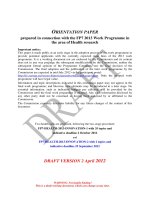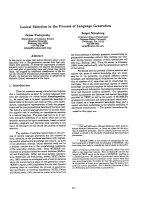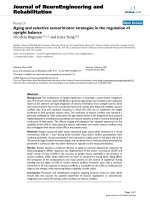MERCHANDISING – MODERN TECHNIQUE USED IN THE PROCESS OF GOODS SALES docx
Bạn đang xem bản rút gọn của tài liệu. Xem và tải ngay bản đầy đủ của tài liệu tại đây (138.08 KB, 6 trang )
GABRIELA BOLDUREANU
TEODOR PĂDURARU
An. Inst. cerc. ec. „Gh. Zane”, t. 18, Iaşi, 2009, p. 129-133
MERCHANDISING – MODERN TECHNIQUE USED IN THE
PROCESS OF GOODS SALES
Etymologically, the term “merchandising” is derived from the noun
“merchandise” that means, in a broad sense, goods, respectively the
assembly of products that constitutes the assortment of a shop, with the
radical “ing” that expresses the voluntary action of the seller to organize
his/her activity, in order to make the shop profitable [6].
The National Marketing Association in the USA considers
merchandising as being “the totality of techniques and previsions required
in order to sell the right product in the right place, in the right quantities, at
the right time and at the right price”. It is the so called rule of the 5R:
1. The Right Product
The right product is the unique compound of three elements: product’s
functions, intrinsic qualities, support system.
“What does the client really buy?” is the question that appears in
connection to the product.
Figure 1. Product in the marketing view
Source: Prutianu Şt. -„ Inteligenţa Marketing Plus ” p. 119.
Boldureanu Gabriela, Teodor Păduraru 2 130
2. The Right Quantity
It depends both on the need to buy and use of the consumer and the
need to buy and sell of the seller.
The factors that the trader has to take into account to determine the
right quantity are:
1. Number of items. Some buyers need only one item, while others
need more items. This is determined by the buying frequency, by the price
sensitivity of the client, by his/her marital status, etc.
2. The size of the item. Products of diverse sizes (medium, small,
large) have a different impact upon the consumers.
3. Unit of measurement (kilogram, liter, piece, etc);
4. Necessity.
It refers to the decision of buying both of the consumer and of the
seller. The buying decision of the seller is more difficult as a too small
quantity of a certain product creates stock rests, and in too large quantities,
leads to larger stocks.
3. The Right Place
In order to choose the right place there are more elements to be taken
into account: market extent, market covering, size and design of the shop.
For the location of a shop, a trader may choose a commercial area, or a
regional or a neighborhood commercial center.
4. The Right Time
In order to determine the right time, the traders have to take into
account: the calendar time (hour, day, week, month, year), season, certain
life events of the consumer: birthdays, weddings, graduations, etc., work
time.
Also it is important the time that passed from the latest acquisition,
especially in the case of staple products and the long use ones.
5. The Right Price
Merchandising involves a certain view characterized by the following
defining elements [5]:
3 Merchandising - modern technique used in the process of goods sales 131
- planning the activity of the shop to reach its objectives, ensuring the
satisfactions of the clients in maximum responsibility conditions;
- orientation towards clients: the starting point for the activity of any
shop is the client, that is why the inner organization has to be done with the
eyes of the client;
- conceiving the shop as a system: an action upon one element of the
system has repercussions upon the assembly of elements that compose the
shop (therefore, a decision regarding the assortment has obvious
consequences upon the line organization, implanting the departments, sales
promotion, management of goods stocks etc.);
- change: the shop is a living organism, situated in a dynamic social-
economic frame; this involves from the management the manifestation of
the capacity of adaptation to the environment changes and in the same time
of market prevision, so that to benefit of the advantages of forecast and
adaptation to the new environment;
- innovation: the shop is not a simple intermediary between producers
and clients. The latter ones wait for ideas, information and diverse
satisfactions. But a satisfaction has a fundamental temporal specific, the
novelty in this field being very important. An “old” satisfaction becomes
rapidly a habit, without being felt so.
Therefore, merchandising is based on the techniques of presentation of
the products at the sales place, using all that could be more attractive:
conditioning and presentation, fractionation, packing, exposure and display
of products in a certain place reserved for a certain type of sale.
Promoting the idea that merchandising is, first of all, “perfect
knowledge of the sales point”, the French specialists consider that the
rational use of each linear meter of furniture, not only as length, but also as
height, depth, became the major issue of the trader, on which it depends
more and more the efficiency of a shop activity.
In order to understand this approach, it is necessary to study the
following three components:
- what is sold: the product;
- the sales place: the ambience created by the interior organization of
the shop;
- the manner of selling: sales methods.
In a synthetic manner, the cardinal points of merchandising may be
considered the ones in figure 2:
Boldureanu Gabriela, Teodor Păduraru 4 132
Figure 2. Reference points of merchandising
Source: Ristea, A. L., Tehnologie comercială, p. 113
The successes recorded by merchandising are due not only to the
modifications in the sales forms, in the sales apparatus structure, but also to
the considerable increase of the number of offered products, modifications
appeared in the purchasing behavior of the buyer. All these determined the
producers and traders to find new promotion techniques. The product is
found alone on the shelf, face to face with the consumer and in competition
with other products. In these conditions, it has to be granted the element that
helps to impose itself. The new techniques of valuing the product, at the
sales place, have the task to substitute the traditional trader [5].
5 Merchandising - modern technique used in the process of goods sales 133
Compulsorily, merchandising starts from an existing product or
service, with the goal to support the sales and gain new markets. As a result
of its practical importance, in the key point of the sales (the shop), the issues
and techniques of merchandising are the preoccupation of both traders and
producers, who often support the efforts of the traders, by allocating
financial resources or by providing technical specialty support for
organizing the sales points, according to a number of merchandising
techniques very well established [5].
In developing an efficient merchandising policy, the producer
participates actively to the action of the trader [2]:
- for a better use of the sales area for its products;
- to optimize the use of sales techniques in linear;
- to adapt the price policy to the specific of the shop;
- to adequate the products and conditionings to the sales characteristics;
- to prolong the image of the products at the sales point.
Introducing the new sales techniques determined functional
modifications in the organization of the shops and gave an impulse to the
modernization of the commercial technique through merchandising [3].
It is obvious that, in order to determine the consumer to purchase new
products, the use of old sales methods is no longer efficient: the new
techniques have to adapt to the new products.
Bibliography
1. Boldureanu G., Elemente de economia şi managementul comerţului, Editura
Performantica, Iaşi, 2007.
2. Dayan, A., ş.a. Le merchandising, Editura Presses Universitaires de France, Paris, 1990,
p. 115.
3. Niţă V., Corodeanu D., Merchandising, Editura Tehnopress, Iaşi, 2003, p.6.
4. Prutianu Şt., Inteligenţa Marketing Plus, p. 119.
5. Ristea A.L., Tudose C., Tehnologie comercială, Editura Expert, Bucureşti, 1995, p.112.
6. Saint C., La pratique du merchandising, Les Editions d`Organisation, Paris, 1993, p.28.









